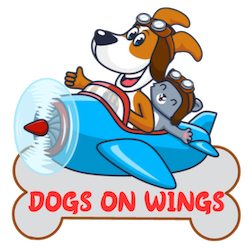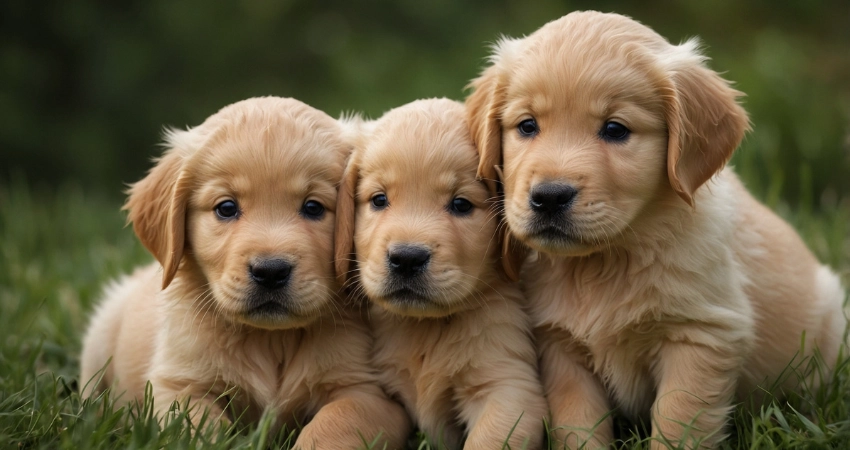Golden Retriever puppies are renowned for their sweetness, intelligence, and energy. Their friendly nature makes them a popular choice for families, couples, and individuals seeking a loyal and loving companion.
However, raising a puppy of this breed involves more than just fun—it requires dedication, patience, and knowledge. Whether you’ve just adopted or are considering bringing a puppy home, being well-prepared is crucial.
Here, we’ll cover all the essential details on how to care for a Golden Retriever puppy so they can grow up healthy, happy, and well-mannered. Additionally, we’ll address common questions and provide tips for helping your pet adapt smoothly to their new home.
Caring for Golden Retriever Puppies
Bringing a Golden Retriever puppy home is an exciting experience, but it’s important to ensure they have everything they need to feel safe and comfortable. Here are some tips to prepare for their arrival:
Essential Items for the Puppy’s Arrival
Before the big day, make sure you have all the necessary items to ease your new friend’s transition. Here’s a detailed list of what to prepare:
Comfortable Bed
Golden Retriever puppies need a quiet space to rest. Choose a soft bed, preferably with raised edges, so they feel secure.
Extra Tip: Place the bed in a calm spot away from drafts. This will help your puppy relax and feel safe.
Interactive Toys
Golden Retrievers are known for their intelligence and energy. Interactive toys are ideal for stimulating their minds and preventing boredom.
- Recommended Types: Chew toys, rubber balls, and dog puzzles.
- Benefits: Keeps the puppy occupied, aids in teething, and prevents destructive behavior.
Stainless Steel Bowls
Opt for stainless steel bowls instead of plastic, as they are more durable, easier to clean, and less likely to harbor bacteria.
Suggestion: Have two bowls—one for fresh water and one for food. Always ensure water is clean and readily available.
Adjustable Leash and Collar
It’s important to get your puppy accustomed to a lightweight, comfortable collar early on. This makes walk training easier and enhances safety.
- ID Collar: Add a tag with your phone number in case your puppy gets lost;
- Safety Tip: Start leash training indoors to help your puppy get used to it before venturing outside.
Crate or Playpen
These items are useful for training and keeping your puppy safe when you can’t supervise them directly.
- Crate: Teach your puppy to see the crate as a safe retreat, not a punishment;
- Playpen: Use it to limit access to certain areas of the house, especially during the training phase.
Puppy-Proofing Your Home
Golden Retriever puppies love to explore, chew, and play with everything they find. To ensure their safety and protect your belongings, it’s essential to puppy-proof your home.
Blocking Dangerous Areas
Puppies often get into places they shouldn’t. Use safety gates to restrict access to stairs, kitchens, or rooms with delicate items.
- Dog Gates: Choose models tall enough to prevent jumping;
- Outlet Covers: Use caps on exposed outlets to avoid accidental shocks.
Safe Storage of Toxic Products
Cleaning supplies, medications, and certain plants can be dangerous if ingested. Store these items in high or locked cabinets.
- Toxic Plants: Avoid lilies, azaleas, and hydrangeas, which are harmful to dogs;
- Secure Trash Cans: Use lidded trash cans to prevent access to food scraps or hazardous items.
Protecting Wires and Cables
Golden Retriever puppies love to chew wires, which can be extremely dangerous. Take these precautions:
- Cable Organizers: Use protectors to cover wires and prevent chewing;
- Hide Wires: Keep them out of reach, behind furniture or inside conduits.
Preparing Your Yard or Outdoor Space for Golden Retriever Puppies
If you have a yard, it must be safe for your puppy to play without risks.
Check Fence Security
Golden Retrievers are active and curious, so they may try to escape if they find a gap.
- Fence Height: Ensure it’s tall enough to prevent jumping;
- Locked Gates: Regularly check gates for any gaps or weaknesses.
Remove Dangerous Plants and Objects
Some seemingly harmless items can pose risks to puppies.
- Garden Tools: Store rakes, shovels, and other tools securely;
- Pools: If you have a pool, consider using a cover or fence to prevent the puppy from falling in.
Create a Dedicated Space for Your Puppy
Having a specific area in the yard for your puppy can help keep them safe and entertained.
- Play Area: Include toys, a comfortable bed, and a shaded spot;
- Potty Area: Train your puppy to use a designated spot for their bathroom needs, making cleanup easier.
Grooming and Coat Care
Golden Retrievers have dense, soft coats that require regular care to stay healthy.
- Brushing: Brush your puppy’s coat 3-4 times a week to prevent matting and reduce shedding;
- Bathing: Bathe your puppy once a month or as needed using dog-specific products;
- Dental Care: Start brushing their teeth early to prevent dental issues.
Additional Hygiene Tips
- Clean their ears weekly to prevent infections;
- Check their paws after walks to remove debris or foreign objects;
- Trim their nails regularly to avoid discomfort and injuries.
Feeding a Golden Retriever Puppy
Proper nutrition is essential for the healthy development of Golden Retriever puppies. Here’s how to ensure your puppy gets the right diet:
The Importance of a Balanced Diet
A nutrient-rich diet helps your puppy grow strong and healthy. High-quality food supports muscle, bone, and immune system development. Key nutrients include:
- Proteins: For muscle growth.
- Omega-3 and Omega-6 Fatty Acids: Essential for skin and coat health.
- Carbohydrates: Provide energy for daily activities.
How Much to Feed a Golden Retriever Puppy
Golden Retriever puppies have small stomachs and need several meals a day. Suggested schedule:
- 2-3 months: 4 meals daily (¼ to ½ cup per meal).
- 4-6 months: 3 meals daily (½ to ¾ cup per meal).
- 6-12 months: 2 meals daily (1 to 1.5 cups per meal).
Feed them puppy-specific food and follow the portion recommendations on the packaging, as these can vary by brand.
Foods to Avoid and Supplements
Certain foods can be harmful or even toxic to dogs:
- Dangerous Foods: Chocolate, grapes, avocado, onion, and garlic;
- Cooked Bones: May cause blockages or intestinal perforations;
- Supplements: Only use if recommended by a veterinarian.
Extra Tip: Always provide fresh, clean water, especially after physical activities.
Training and Socializing Your Puppy
Training and socializing your Golden Retriever puppy are crucial to ensure they grow into a well-behaved and sociable adult dog.
Basic Training and Essential Commands
Golden Retriever puppies are highly intelligent and learn quickly, especially with positive reinforcement.
- “Sit” Command: Use treats and praise when the puppy obeys.
- “Stay” Command: Teach them to remain in place until released.
- “Come” Command: Vital for recall in open spaces.
Early Socialization
Socializing your puppy helps prevent fear or aggression in adulthood but should begin after completing the vaccination schedule recommended by your vet.
- Exposure to Different Environments: Take them to parks, busy streets, and other areas;
- Interaction with Other Dogs and People: Let them play with other dogs under supervision.
Socialization Tips
- Allow controlled interactions with vaccinated dogs in safe environments;
- Use toys and treats to encourage positive interactions;
- Never force your puppy to interact if they seem anxious or scared.
Addressing Unwanted Behaviors
It’s common for Golden Retriever puppies to bite, especially during teething.
- Offer specific chew toys;
- Correct behavior gently by redirecting them to a toy.
Health Care for Golden Retriever Puppies
Your puppy’s health should be a top priority from the start. Here’s what you need to know about veterinary care:
Vaccination and Deworming
Vaccines are crucial for protecting your puppy against serious diseases. Take your puppy to the vet immediately after adoption to begin their vaccination schedule.
Regular Check-Ups and Health Exams
In addition to vaccinations, regular check-ups help ensure your puppy is growing healthily.
- Blood Tests: Monitor overall health.
- Dental Check: Golden Retriever puppies may develop dental issues requiring attention.
Extra Tip: Build a trusting relationship with your vet so they are familiar with your dog’s health history.
Final Thoughts: Ensuring a Happy Life for Your Golden Retriever
Raising a Golden Retriever puppy can be challenging, but it’s also incredibly rewarding. With love, patience, and proper care, you’ll have a loyal companion for years to come.
Enjoy this stage, as puppyhood passes quickly. With the right training and socialization, your Golden Retriever will grow into a balanced and happy dog.

